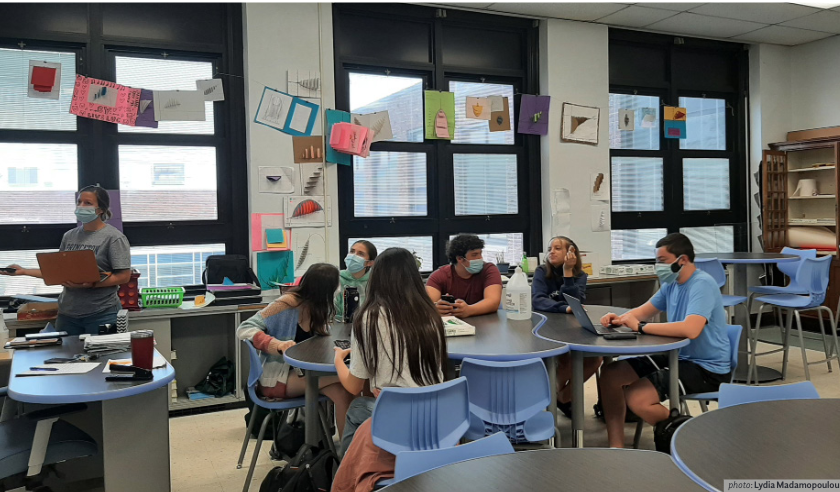PPS Math curriculum review initiates conversations about equity
June, 2022
On May 24, Princeton Public Schools held a board meeting to discuss plans for the next school year. One topic the board members discussed was a potential reform to the math curriculum, which is reviewed by a presentation delivered by Supervisor of Business and Mathematics Stephanie Tidwell on March 29. The presentation also summarized key points from Rowan University Mathematics Professor Dr. Eric Milou’s research.
Since 2019, the district has provided Pre-Algebra Accelerated classes for sixth grade students. Afterwards, students have the option to take Algebra I Part I or Algebra I Accelerated. This allows eighth grade students to end middle school at either Algebra I Part 2 or Algebra II Accelerated. Entering high school, freshmen have multiple math tracks that they can take depending on their academic history and future interests. This can range from revisiting Algebra I to starting with Geometry Accelerated, Algebra II Accelerated, or Pre-Calculus Accelerated. In reviewing the current opportunities, a new math committee discussed the goals of the math program. One of these directions, put forward by Dr. Milou, was to have all high school students begin at the same level — Algebra I. With this track, seniors would end with Pre-Calculus or AP Statistics. This proposal resulted in much confusion surrounding the future of the high school math curriculum. The district then addressed these rumors in a question-and-answer format.
“We maintain the fact that our intentions were never to reduce or eliminate any courses. In fact, we’re looking at how we might be able to add more courses to the sequence,” said Tidwell. “Many of you have already seen the Program of Studies for next year. There were no changes to courses. So this [meeting] was our process of collecting information; for what we think we can do moving forward.”
In assessing the various options to improve educational equity, the district consulted Dr. Milou, whose research supported the idea of detracking the math course, saying that it could to provide all students the same opportunities in school. He also believes that accelerated math courses in middle school forces students to rush through the material rather than reach a full understanding of the curriculum that serves as an important foundation for advanced math.
While there are currently no plans from the district to remove higher-level math, these rumors sparked discussions regarding the importance of accelerated and AP courses, and the need to address the achievement gap. As accelerated courses have always been a part of PHS’s academic culture, many members of the PPS community have voiced their disagreements with the district’s presented method. AP Calculus teacher Valerie Rodriguez describes PHS as unique because students are always striving to be high-achieving and challenged by their courses, thus making accelerated and AP courses an integral part of a student’s academic journey.
“I think that allowing the opportunity for a student to maximize their growth in a class is a positive,” said Rodriguez. “With that being said, I think we are constantly looking to branch out ... to find other areas of interest that are related to mathematics that we can build rigorous courses around, so that one does not have to stay kind of stuck to the traditional pathway of math. ... Math has so many different pockets in our lives. And [if ] we can tap into different interests and passions mathematically, but also achieve the academic rigor that we’re always looking for, that would be a win for everybody.”
Aside from teachers, parents also voiced their concerns over the district’s direction with the math curriculum. A parent group formed and wrote an eight-page statement in which they detailed their disagreements with the district’s proposal, provided suggestions for moving forward, and presented overall frustrations with the board. Similar to Rodriguez, Leonidas Nguyen and Ryan Bubb, parents of PPS students and writers of the report, believe that removing higher-level courses is not synonymous with achieving equity.
“There’s a definition of equity that we quote in our report, and at the heart of it is giving every child the support they need to reach their fullest potential. And what that means for some kids in certain subjects is they will have a knack for that subject, and will learn at a quicker pace,” said Bubb. “Of course, that’s just variation in the human condition. And when that happens, I think those kids have a right to a form of instruction, where they learn new things in each class every day. And it’s inequitable to those students to not meet them where they are.”
Furthermore, the parent group believes that the removal of higher-level math could increase inequities even more, especially if families will have to resort to advancing studies on their own.“If my children aren’t able to take math courses that are appropriate for their current level of mastery of math, we will go get their math education elsewhere. We are very blessed and will be able to do that. But not everyone in this community has the resources to do that. And it’s those families that will be most affected,” Nguyen said.